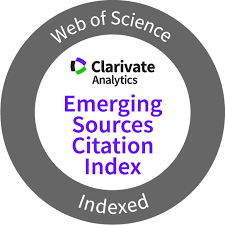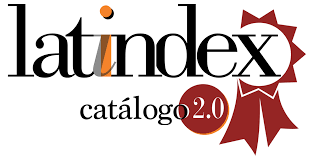How can organizational communication impact society? Reflections from the communication practice in Portuguese communication agencies / ¿Cómo la comunicación organizacional puede impactar a la sociedad? Reflexiones por la práctica de comunicación en las a
DOI:
https://doi.org/10.5783/revrrpp.v12i23.754Keywords:
Organizations, organizational communication, impact, societyAbstract
This investigation aims to reflect on the impact generated by organizational communication in society, considering its capacity to interfere in the public sphere construction. For this, theoretical research was made addressing the communicative constitution of organizations and their relationship with society. Furthermore, in-depth interviews were conducted with Portuguese communication agencies for verifying perceptions about the communication impact in society. In the results, it was identified that to evidence this impact, it is necessary to discuss the communication organizational power in the interactional context and the discourse influence in individuals' perceptions and behaviors formation.
Keywords: organizations, organizational communication, impact, society.
Resumen
Esta investigación tiene como objetivo reflexionar sobre el impacto que genera la comunicación organizacional en la sociedad, considerando su capacidad para interferir en la construcción de la esfera pública, mediante la perspectiva de los profesionales de la comunicación portugueses. Para eso, apoyados en una perspectiva teórica de comunicación organizacional y comunicación para el desarrollo, se realizaron entrevistas en profundidad con agencias de comunicación. Para comprender el impacto, los resultados muestran que es necesario discutir el poder de la comunicación organizacional en el contexto interaccional y la influencia del discurso en las percepciones y comportamientos de los individuos.
Palabras claves: organizaciones, comunicación organizacional, impacto, sociedad.
Downloads
References
CARARETO, M. (2022). A influência da lógica discursiva das organizações empresariais na construção da sociedade: um olhar dos profissionais brasileiros e portugueses de comunicação diante do contexto em midiatização. (Tese de Doutorado). Unesp, Bauru, SP, Brasil. Retrieved from https://repositorio.unesp.br/handle/11449/234533.
COOREN, F., KUHN, T., CORNELISSEN, J. P. AND CLARK, T. (2011). Communication, organizing, and organization: an overview and introduction to the special issue. Organization Studies, 32(9), 1149-1170. Retrieved from https://doi.org/10.1177/0170840611410836.
DOANE, D. (2003). Uma perspectiva alternativa sobre marcas: mercados e princípios morais. En Clifton, R. and Simmons, J.. O Mundo das Marcas (211-225). Lisboa: Actual Editora.
EDELMAN (2021). Global Report Edelman Trust Barometer 2021. Retrieved from https://www.edelman.com.br/estudos/edelman-trust-barometer-2021.
FULK, J. (2014). Communication and Organization-society relationship. In: Putnam, L. L. y Mumby, D. K. The Sage Handbook of Organizational Communication: Advances in Theory, Research, and Methods (3ª ed, 689-694). USA: Sage Publications.
HILTON, S. (2003). O valor social das marcas. In: Clifton, R. y Simmons, J. O Mundo das Marcas (47-66). Lisboa: Actual Editora.
IHLEN, Ø. AND VERHOEVEN, P. (2017). Organization-society relationship. In: Scott, C. R., Lewis, L., Barker, J. R., Keyton, J., Kuhn, T. y Turner, P. K. The International Encyclopedia of Organizational Communication (1-9). Retrieved from https://doi.org/10.1002/9781118955567.wbieoc157.
KOTLER, P. (2017). Marketing 4.0. Rio de Janeiro: Sextante.
KOTLER, P., HESSEKIEL, D. AND LEE, N. (2012). Good works! marketing and corporate initiatives that build a better world and the bottom line. USA: Wiley.
LIMA, F. P. AND OLIVEIRA, I. L. (2014). O discurso e a construção de sentido no contexto organizacional midiatizado. In: Marchiori, M. (Coord.). Contexto organizacional midiatizado (85-97). São Caetano do Sul: Difusão.
MORRIS, N. (2003). A Comparative Analysis of the Diffusion and Participatory Models in Development Communication. Communication Theory, 13(2), 225-248. Retrieved from https://doi.org/10.1111/j.1468-2885.2003.tb00290.x.
PUTNAM, L. L. AND MUMBY, D. K. (2014). Introduction: Advancing Theory and Research in Organizational Communication. In: Putnam, L. L. y Mumby, D. K.. The SAGE Handbook of Organizational Communication (3º ed., 01-18). USA: Sage Publication.
SERVAES, J. (2020a). Terms and Definitions in Communication for Development and Social Change. In: Servaes, J.. Handbook of Communication for Development and Social Change (53-79). Singapore: Springer. Retrieved from https://doi.org/10.1007/978-981-15-2014-3.
SERVAES, J. (2020b). Communication for Development and Social Change: In: Search of a New Paradigm. In: Servaes, J.. Handbook of Communication for Development and Social Change (80-111). Singapore: Springer. Retrieved from https://doi.org/10.1007/978-981-15-2014-3.
VAN RULER, B. (2016). Public Relations: Too little emphasis on communication. Communication Management Review, 1(1), 6–27. Retrieved from http://dx.doi.org/10.22522/cmr20160101.
VAN RULER, B. AND VERCIC, D. (2003). Perspectivas europeias das relações públicas. Comunicação & Sociedade, 24 (39), 155-172. Retrieved from https://doi.org/10.15603/2175-7755/cs.v24n39p155-172.
WILKINS, K. G., TUFTE, T. AND OBREGON, R. (2014). Introduction. In: Wilkins, K. G., Tufte, T. and Obregon, R.. The Handbook of Development Communication and Social Change (01-04). UK: Wiley-B.
ZOLLER, H. M. (2014). Power and Resistance in Organizational Communication. In: Putnam, L. L. y Mumby, D. K. The SAGE Handbook of Organizational Communication. (3º ed., 595-618). USA: Sage Publication.
Downloads
Published
How to Cite
Issue
Section
License
Authors publishing in this journal agree to the following terms:
a. Authors retain copyright and grant the journal the right to be the first publication of the work as licensed under a Creative Commons Attribution License that allows others to share the work with an acknowledgement of authorship of the work and initial publication in this journal.
b. Authors may separately enter into additional arrangements for non-exclusive distribution of the version of the work published in the journal (e.g., placing it in an institutional repository or publishing it in a book), with an acknowledgement of initial publication in this journal.
c. Authors are allowed and encouraged to disseminate their work electronically (e.g. in institutional repositories or on their own website) before and during the submission process, as it can lead to productive exchanges, as well as earlier and higher citation of published work (see The Effect of Open Access).




